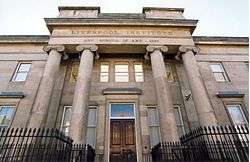Liverpool Institute for Performing Arts
The Liverpool Institute for Performing Arts (LIPA) is a performing arts higher education institution in the English city of Liverpool, founded by musician Paul McCartney and Mark Featherstone-Witty and opened in 1996. LIPA offers eleven full-time BA Honours degrees in a range of fields across the performing arts, as well as three Foundation Certificate programmes of study in acting, dance and popular music, and music technology. LIPA offers full-time, one-year masters-level degree courses in Acting (Company) and Costume Making. It is a member of the Federation of Drama Schools.[1]
| Liverpool Institute for Performing Arts | |
|---|---|
 LIPA's main entrance, on Mount Street | |

| |
| General information | |
| Town or city | Liverpool, Merseyside |
| Country | England |
| Coordinates | 53°23′58.4″N 2°58′20.3″W |
| Construction started | 1990 |
| Completed | 7 June 1996 |
| Cost | £20m |
| Design and construction | |
| Architect | David Watkins – Brock Carmichael Architects |
| Website | |
| lipa.ac.uk | |
The Education Guardian has previously ranked LIPA No. 1 in the UK for several of its degree courses, and it is regularly ranked as one of the top 10 specialist institutions.[2] LIPA has been awarded gold by the Government's Teaching Excellence Framework (TEF), which rates higher education providers by teaching quality.[3]
In September 2003, LIPA launched LIPA 4–19; a part-time performing arts academy for 4 to 19-year olds. Since then, a satellite school and associate academies have also been launched. LIPA started its own primary free school in 2014 and its own sixth form free college in September 2016.
History
Formation
LIPA was founded by Paul McCartney and Mark Featherstone-Witty. McCartney had known since 1985 that the building which had housed his old school — the Liverpool Institute High School for Boys – was becoming increasingly derelict after the school's closure, and wished to find a productive use for it; Featherstone-Witty had set up the Brit School in London and was looking for an opportunity to open another school.
Featherstone-Witty had been inspired by Alan Parker's 1980 film Fame, to think about what the best possible training would have been for work in the arts and entertainment industry. The film led him to conclude that performing artists needed to train in all three performing arts (acting, dance and music) at the same time. He also took into account that performers form only a part of the arts and entertainment business. From these basic concepts, he created a blueprint for a new type of training and began consulting with others in the industry. By 1985 he had support from just under 50 artists, directors, choreographers and entrepreneurs.
Record producer George Martin knew that Featherstone-Witty was looking for somewhere to develop a school, and that McCartney was looking for someone who could save the building, and introduced them to each other. The process of setting up the facility and the school took seven years and cost £20m.
1996–today
LIPA was opened by Queen Elizabeth II on 7 June 1996, and since then its range of courses has expanded each academic year. LIPA marked its 10th birthday in January 2006 with a performance at the Liverpool Philharmonic Hall and a new book, LIPA – The First Ten Years in Pictures,[4] written by Featherstone-Witty.
A recent survey of graduates who left in 2014 showed that 91% were in work, and 83% of those were working in the performing arts.[5] The curriculum is regularly changed in an attempt to maintain this situation.[6]
LIPA was designated as a higher education institution (HEI) in 2006. As a performing arts HEI, LIPA is attended by the highest number of international students in the UK.[7]
LIPA has been awarded the Gold Standard from Investors in People – the only HEI to have achieved this level in the UK.[8] LIPA also has the highest concentration of Fellows and Associates recognised by the Higher Education Academy.
In March 2012, LIPA announced that it had purchased the former building of the Liverpool College of Art for £3.7 million, to expand its teaching accommodation.[9]
Building work started on the Art School in 2014, and was completed in August 2016. Under the Free School programme, LIPA opened a primary school nearby in 2014, and a Sixth Form College in September 2016, both of which became oversubscribed.
Admissions
There were 5,225 applications to the institute through UCAS in 2010, of which 208 were accepted, giving the Institute an acceptance rate of 4%. Undergraduate tuition fees were £9,250 GBP in 2019, and International tuition fees were £16,200 GBP for 2019.
Current courses
LIPA qualifications are validated by Liverpool John Moores University.[6]
Foundation Certificates
- Foundation Certificate in Acting
- Foundation Certificate in Dance
- Foundation Certificate in Popular Music and Sound Technology
Undergraduate (Degree)
- BA (Honours) Acting
- BA (Honours) Acting (Screen & Digital Media)
- BA (Honours) Applied theatre & Community Drama
- BA (Honours) Creative Technologies & Performance (BA (Hons)/MArts programme)
- BA (Honours) Dance
- BA (Honours) Music
- BA (Honours) Music (Song Writing & Performance)
- BA (Honours) Music (Song Writing & Production)
- BA (Honours) Management of Music, Entertainment, Theatre & Events
- BA (Honours) Sound technology
- BA (Honours) Theatre and Performance Design
- BA (Honours) Theatre and Performance Technology
Companions
LIPA does not issue its own degrees, so rather than issuing Honorary degrees like other British universities, it awards "Companionships" to individuals in recognition of their contributions to the world of art and entertainment, particularly within the sectors LIPA is associated with. Prospective companions usually visit LIPA at least once before they are invited to become companions to give masterclasses to students, or to participate in "Conversation with" type question and answer sessions. Some then come back to the institute at later dates.
Companionships awarded by the institution are:
- 2001: Joan Armatrading +; Benny Gallagher; Malcolm McLaren
- 2002: Stephen Bayley; Anthony Field; Thelma Holt; Tony Wilson
- 2003: Barbara Dickson; Anthony Everitt; Nickolas Grace; Andy McCluskey
- 2004: The Bangles; Ken Campbell (actor); Tim Firth; Terry Marshall; Arlene Phillips; Willy Russell; Jon Webster
- 2005: Guy Chambers; Robin Gibb; Alec McCowen; Tim Wheeler
- 2006: Lynda Bellingham; Sir Ken Robinson; Jörg Sennheiser; Terence Stamp; David Stark
- 2007: Anita Dobson; Alan McGee; David Pugh; Ralph Koltai; Steve Levine; Ben Elton
- 2008: John Hurt; Trevor Horn; Cathy Dennis; Ann Harrison; Nitin Sawhney; Lea Anderson
- 2009: Will Young; Joe McGann; Pippa Ailion; John Fox; Richard Hudson; Natricia Bernard; Tony Platt
- 2010: Alan Moulder; LaVelle Smith Jnr; Dave Pammenter; Christopher Oram; Jonathan Pryce; Heather Knight; Midge Ure; Mark Summers was also presented as an Honoured Friend.
- 2011: Colin Eccleston; David Bell; Paule Constable; Caroline Elleray; Chris Johnson; Steve Nestar; Billy Ocean; Hannah Waddingham; Spencer Leigh was also presented as an Honoured Friend.
- 2012: Matthew Bourne; Pam Schweitzer; Kevin Godley; Gary lloyd; Michael Harrison; Jason Barnes; Owen Lewis; Victor Greenberg was also presented as an Honoured Friend
- 2013: Keith Johnstone; Mark Ronson; Stephen Mear; Xenon Schoepe; Andy Hayles; Seymour Stein; Rowena Morgan was also presented as an Honoured Friend
- 2014:[10] Don Black; Samuel West; Adrian Jackson; Nick Starr; Colin Richmond; Patrick Woodroffe; Briony Albert; Giles Martin. Janice Long and Suzahn Fiering were presented as Honoured Friends.
- 2015:[11] Gemma Bodinetz; Fran Healy; Noddy Holder; Conor Murphy; Hugh Padgham; Scott Rodger; James Thompson; Sharon Watson. John T Rago was also presented as an Honoured Friend
- 2016:[12] Martin Levan; Tim Prentki; David Babani; Darren Henley; Christopher Manoe; Alan Lane; Christopher Shutt; Tom Robinson. Tetsuo Hamada; Paul Whiting were also presented as honoured friends
- 2017:[13] Woody Harrelson; Chris Difford; John Caird; Jon Burton; Kay Hilton; Jo Collins; Mary Ward; Jon Driscoll. Tony Wood was also presented as an honoured friend.
- 2018:[14] Toyah Willcox; Nile Rodgers; John Leonard; Paul Burger; Ali Campbell; Felice Ross; Dean Lee.
- 2019:[15] Stephen Fry; Rowan Atkinson; Mike Batt; Lucy Carter; Sue Gill; Steve Lewis; Tom Pye; Kenrick Sandy; Andrew Scheps. Cliff Cooper was made an Honoured Friend of LIPA.
+ denotes a Companion who is also a LIPA Patron.
Notable alumni
- Jonas Alaska, Norwegian singer-songwriter
- Lisa Ambalavanar, actress (Doctors, The A List)
- Donnaleigh Bailey, actress (Doctors)
- Leanne Best, film and television actress
- Alyssa Bonagura (2009) American singer/songwriter
- Gabrielle Brooks, actress
- Jan Burton, music producer
- Edward Croft, guitarist and vocalist in comedy act Jollyboat
- Dan Croll, singer-songwriter
- Mike Crossey, music producer and mix engineer
- Mark Franks, singer in The Overtones
- Leah Hackett, actress who played Tina Reilly in Hollyoaks
- Jesse Harlin, composer for video games
- Kate Havnevik, Norwegian singer-songwriter
- David Hutchinson, founder and Artistic Director of Selladoor Worldwide
- Christian Ingebrigtsen, Norwegian singer-songwriter and musician (A1)
- Andrew Langtree, actor
- Rachel Leskovac, actress (Coronation Street)
- Jamie Lloyd, director
- Jon Lolis, actor (Hollyoaks)
- Liam Lynch, US-based singer, writer & director
- Eugene McGuinness, singer/songwriter signed to Domino records.
- Dawn O'Porter, writer, director and TV presenter
- Mikhael Paskalev, Norwegian singer-songwriter
- Kent Riley, actor who played Zak Ramsey in Hollyoaks
- Iselin Solheim, Norwegian singer and songwriter
- Stealing Sheep, folk band (Rebecca Hawley)
- Lisa Stokke, Norwegian singer and actress
- Sandi Thom, Scottish singer-songwriter
- Liz White, actress (Life on Mars)
- The Wombats, indie rock trio
- Fickle Friends, indie pop band (Natassja Shiner, Sam Morris)
- Douglas Dare, singer-songwriter
- Circa Waves, indie rock band (Joe Falconer, Sam Rourke)
- Stuart Matthew Price, actor, dancer and West End performer
- Ryan Prescott, actor Coronation Street
- The Daydream Club, music duo
- Peter Caulfield, actor
- Sentric Music, CEO Chris Meehan
- Jean-Philip Grobler, St Lucia (band)
- Clean Cut Kid, indie pop band
- Mads Hauge, songwriter and producer
- Hannah Peel, artist, producer, composer
- The Staves, folk trio (Jessica Staveley-Taylor)
- Raghav, singer-songwriter
- Jaz Dhami, folk-hop artist
- Henrik Barman Michelsen, songwriting and production duo Electric
- Her's, indie rock duo (Stephen Fitzpatrick, Audun Laading)
- Seun Kuti, Afrobeat musician and son of Fela Kuti
See also
- Liverpool Knowledge Quarter
- Liverpool Institute High School for Boys
References
- Granger, Rachel. "Rapid Scoping Study on Leicester Drama School" (PDF). De Montfort University Leicester. Retrieved 7 September 2019.
- Elson, Peter (20 February 2013). "Paul McCartney's "Fame School" to reign in Spain". liverpoolecho. Retrieved 25 March 2018.
- "McCartney Uni sees number of firsts given soar". ITV News. Retrieved 25 March 2018.
- Featherstone-Witty, Mark (23 January 2006). "LIPA in Pictures: The First 10 Years". Schools for Performing Arts. Retrieved 1 August 2017 – via Amazon.com.
- "LIPA". Lipa.ac.uk. Retrieved 1 August 2017.
- "About Us". Lipa.ac.uk. Retrieved 1 August 2017.
- "International Students". Lipa.ac.uk. Retrieved 1 August 2017.
- "LIPA website – 'LIPA sets new standard in performing arts sector'". Lipa.ac.uk. Archived from the original on 18 November 2016. Retrieved 1 August 2017.
- "Paul McCartney's LIPA buys John Lennon's art college building". BBC. 30 March 2012. Retrieved 1 August 2017.
- Lorna Hughes (11 July 2014). "Legendary lyricist Don Black to be honoured by LIPA". Liverpool Echo. Retrieved 1 August 2017.
- Pattinson, Rob (28 July 2015). "Sir Paul McCartney back in Liverpool for annual LIPA graduation ceremony". Liverpool Echo. Retrieved 1 August 2017.
- "Archived copy". Archived from the original on 29 July 2016. Retrieved 26 July 2016.CS1 maint: archived copy as title (link)
- "LIPA News: Hollywood A-lister among new LIPA Companions". Lipa.ac.uk. Retrieved 1 August 2017.
- "Nile Rogers among new LIPA Companions". theguideliverpool.com. Retrieved 27 July 2018.
- "LIPA News: Blackadder reunion as two comedy legends are made LIPA Companions". Lipa.ac.uk. Retrieved 3 March 2020.
External links
- LIPA 'History & Heritage page'
- LIPA website
- LIPA 4:19 Primary School
- LIPA Sixth Form College
- LIPA Alumni page
- "The Liverpool Institute for Performing Arts guide". The Daily Telegraph. Retrieved 1 August 2017.
